Mindfulness vs Meditation: Is there a difference?
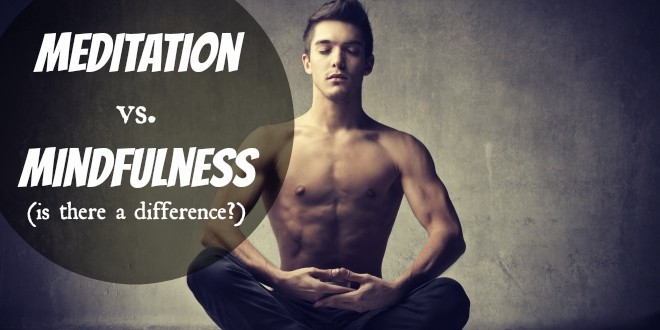
Two terms that are getting a lot of attention lately are meditation and mindfulness
.
[caption id="attachment_19966" align="alignright" width="331"]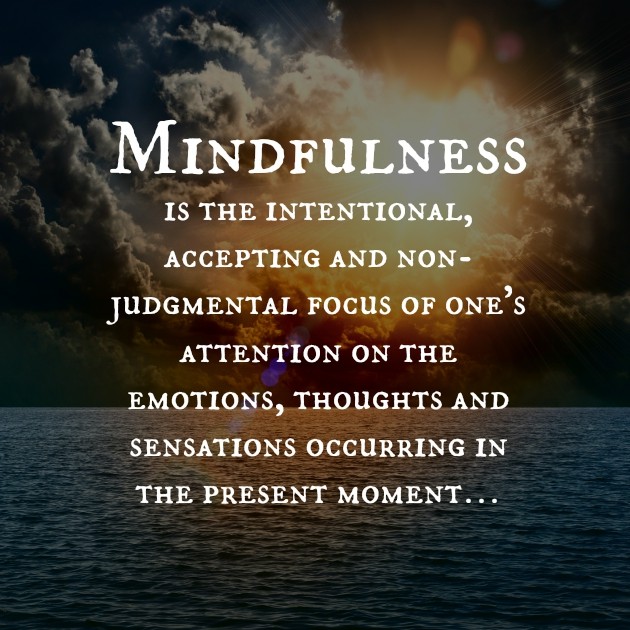 What's 'mindfulness' mean to you?[/caption]
What's 'mindfulness' mean to you?[/caption]
Most people are familiar with meditation (even if their view of it is a caricature of what it actually is), but mindfulness is a newer term to enter the mainstream, so let’s start by helping people understand what it really is. According to Wikipedia , mindfulness is defined as follows:
“Mindfulness is the intentional, accepting and non-judgmental focus of one's attention on the emotions, thoughts and sensations occurring in the present moment…”
That last part - “ in the present moment ” - is really the key to mindfulness.
Interestingly, Wikipedia goes on to say that you can train to be mindful through meditation, and the entire concept is an essential element of Buddhism. So right off the bat, we find the two are really intertwined.
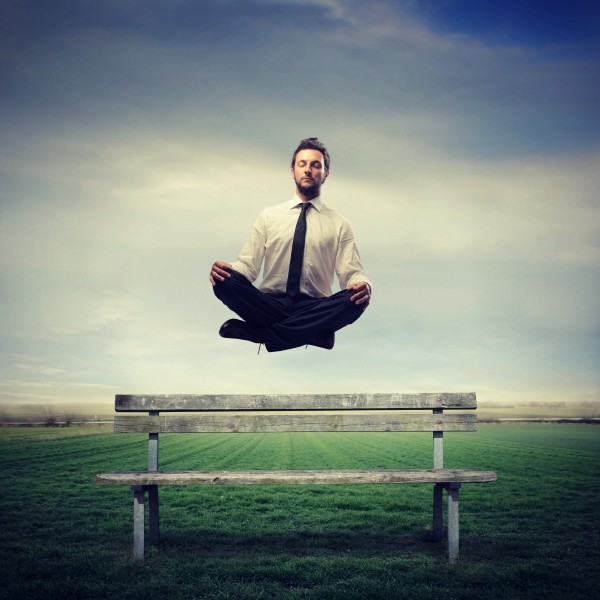 I think a lot of people immediately picture a swami-looking person with legs crossed in a way they feel their legs don’t cross, keeping perfectly still for hours or even days and being emaciatedly-thin. And then they wonder if ‘emaciatedly’ is a word. It isn’t. But that’s neither here nor there. And neither is this image of what meditation is. It is about clearing the mind of thoughts, distractions and allowing it to be at peace and to naturally sort of drift into another state where thoughts are clearer, and don’t elicit a physical reaction but instead of simply pure cognition. It’s not necessarily the easiest thing to describe at times, and is often met with the question of how you think about nothing. Meditation isn’t quite thinking about nothing so much as perhaps not thinking about something. Sort of the flip side of the phrase.
I think a lot of people immediately picture a swami-looking person with legs crossed in a way they feel their legs don’t cross, keeping perfectly still for hours or even days and being emaciatedly-thin. And then they wonder if ‘emaciatedly’ is a word. It isn’t. But that’s neither here nor there. And neither is this image of what meditation is. It is about clearing the mind of thoughts, distractions and allowing it to be at peace and to naturally sort of drift into another state where thoughts are clearer, and don’t elicit a physical reaction but instead of simply pure cognition. It’s not necessarily the easiest thing to describe at times, and is often met with the question of how you think about nothing. Meditation isn’t quite thinking about nothing so much as perhaps not thinking about something. Sort of the flip side of the phrase.
OK, since I’m failing at being clear enough on this concept we all get but perhaps struggle to put into simple words, let’s see what Wikipedia has to say about it :
“Meditation is a practice in which an individual trains the mind or induces a mode of consciousness , either to realize some benefit or for the mind to simply acknowledge its content without becoming identified with that content, or as an end in itself.”
Whenever I think of meditation, I think back to Dai’s #300ADay Challenge where part of that month’s challenge involved 3 minutes of meditation. The most frequent comments that month were about how hard the meditation was. I think that’s part trendiness (it’s trendy to complain about how busy you are and how hard it is to find time to just sit and clear your mind with everything going on), and part that it literally is tough for many people to just do. The good news is that you don’t have to just do it. You can get some help.
While I meditate, I’m by no means a master practitioner, nor a teacher of how to meditate. For that, I usually recommend people check out Headspace , a free program to start to train your mind on how to meditate through a simple 10-day, 10-minute-per-day program. It’s how I got into meditation, and really found the tools useful for bringing my mind and, by extension, my body back to center and to stop a spiraling of emotions – be it anger, angst, anxiety or any other feeling that starts with an A or other letter. While the free program is a great start, Headspace offers an annual subscription (or month-to-month plan) if you want to keep going and access specific meditations for specific purposes, like athletic performance, anxiety management, etc.
So how do you take meditation and move to mindfulness? Well, if meditation is about a specific practice for a specific amount of time where you enter a sort of different type of consciousness, mindfulness is about how to be the rest of the time. It’s about being present in the moment and attending to the right now and not worrying about what might happen or living in the past (for better or worse).
[box type="note" align="" class="" width=""] Note: Here's a 'not so' Practical Guide to Mindfulness (note, make sure children are not within earshot)
https://www.youtube.com/watch?v=92i5m3tV5XY
[/box]
I find mindfulness is best described with an example.
If I messed something up (I know, hard to imagine, right?), the standard way we deal with that is to feel guilt, embarrassment, shame or some other bad feeling about it even after it’s happened. That negative feeling from something we can’t go back in time and not do then impacts how we are now. Add to this how, in the present, post-mess-up-moment, we start fretting about how bad everything will turn out because of what we did. So we’re loaded up with shame from what we did, and at the same time paralyzed by fear of what will happen – getting yelled at, losing your job, going to jail, getting dumped.
Whatever it is, the present moment ends up defined by feelings from the past and future.
[tweet_box design="box_12"]How can you handle the present if you’re overwhelmed by what was and what will be?[/tweet_box]
What if you could make things better in the here and now? How do you expect to find that solution if you’re busy beating yourself up and worrying?
You could probably come up with some solution, but not likely the best outcome because it will be tainted by these negative feelings book-ending your thought process. Mindfulness is about letting the past be the past, not focusing on what hasn’t yet happened, and instead paying full attention to now to make the best decisions and take the best actions for this very moment.
[caption id="attachment_16908" align="aligncenter" width="600"]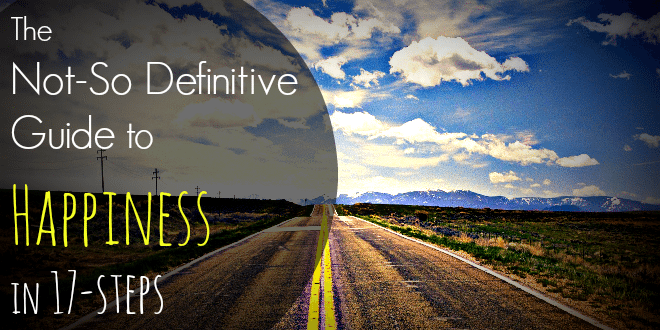 Be mindful of your happiness in 17 steps... have a read here
[/caption]
Be mindful of your happiness in 17 steps... have a read here
[/caption]
My first example is a negative situation, but the impact of not being mindful can be from positive things, too. I’m going to give you a first-hand example of how I met my wife.
I knew from the moment I saw her that she was “the one”. I was also just starting business school. The day after I first really talked to her and got to know her, I was completely useless in class. My thoughts were consumed with remembering our conversation, wishing I had said this or that instead of whatever I had said, and anticipating our next conversation or what I could say or do to get her to go out with me. I couldn’t focus in class at all, and actually have little to no memory of about two weeks of my life because of that (this was years ago, but the memory lapse was obvious to me as it was all happening, so this isn’t just about the passage of time or me being older and more forgetful).
Being so focused on an experience and potential future ones cost me all the present experiences. And those present experiences also included running into her randomly during the day and not even being able to process the chance encounters, which of course I then obsessed about afterward with thoughts of, “ Oh, man, if I could have just said XYZ instead of standing there like an idiot! ” So my lack of mindfulness actually fueled a further spiraling into a greater lack of mindfulness.
This was clearly a vicious cycle.
[caption id="attachment_19971" align="aligncenter" width="600"]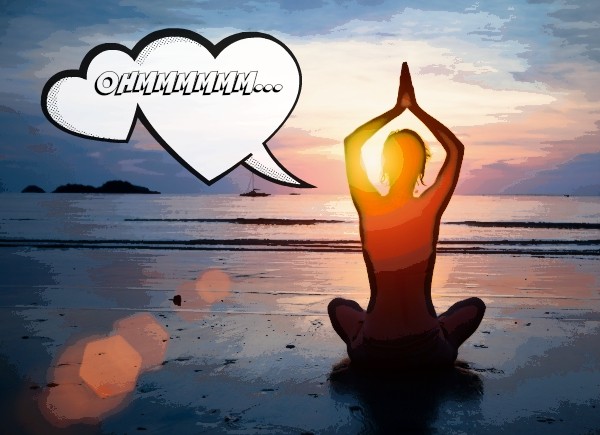 If life was only a beach...[/caption]
If life was only a beach...[/caption]
So I think you get what mindfulness is all about, and perhaps more about how I feel about my wife than you expected to in an article about meditation.
The question is really how do you become more mindful? The answer is a two-step approach (with some sub-steps)...
[caption id="attachment_19972" align="alignright" width="330"]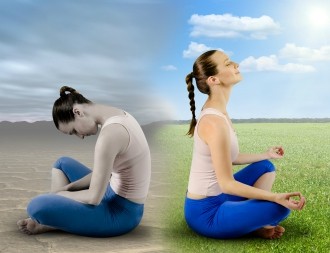 Bring 'happy' back to life[/caption]
Bring 'happy' back to life[/caption]
So bring a meditation practice into your life, and use the benefits this brings to start to be more present in your life. You’ll appreciate things more and people will appreciate your participation more as it is genuine, invested in what’s at hand and more balanced as it’s freed of the emotions of the past and future.
Bryan Falchuk is the founder of newbodi.es health and fitness coaching and training. He spent the first 2/3 of his life overweight or battling being overweight before transforming his life into one focused on health, fitness and happiness. He coaches and trains people looking to change their lives, has an active YouTube channel and podcast , and shares his own health journey and inspiration via his blog , Instagram and Twitter.
[caption id="attachment_19966" align="alignright" width="331"]
 What's 'mindfulness' mean to you?[/caption]
What's 'mindfulness' mean to you?[/caption]Most people are familiar with meditation (even if their view of it is a caricature of what it actually is), but mindfulness is a newer term to enter the mainstream, so let’s start by helping people understand what it really is. According to Wikipedia , mindfulness is defined as follows:
“Mindfulness is the intentional, accepting and non-judgmental focus of one's attention on the emotions, thoughts and sensations occurring in the present moment…”
That last part - “ in the present moment ” - is really the key to mindfulness.
Mindfulness vs Meditation: What's the difference?
Interestingly, Wikipedia goes on to say that you can train to be mindful through meditation, and the entire concept is an essential element of Buddhism. So right off the bat, we find the two are really intertwined.
Meditation Needn’t Only Be for Yogis and Buddhists
 I think a lot of people immediately picture a swami-looking person with legs crossed in a way they feel their legs don’t cross, keeping perfectly still for hours or even days and being emaciatedly-thin. And then they wonder if ‘emaciatedly’ is a word. It isn’t. But that’s neither here nor there. And neither is this image of what meditation is. It is about clearing the mind of thoughts, distractions and allowing it to be at peace and to naturally sort of drift into another state where thoughts are clearer, and don’t elicit a physical reaction but instead of simply pure cognition. It’s not necessarily the easiest thing to describe at times, and is often met with the question of how you think about nothing. Meditation isn’t quite thinking about nothing so much as perhaps not thinking about something. Sort of the flip side of the phrase.
I think a lot of people immediately picture a swami-looking person with legs crossed in a way they feel their legs don’t cross, keeping perfectly still for hours or even days and being emaciatedly-thin. And then they wonder if ‘emaciatedly’ is a word. It isn’t. But that’s neither here nor there. And neither is this image of what meditation is. It is about clearing the mind of thoughts, distractions and allowing it to be at peace and to naturally sort of drift into another state where thoughts are clearer, and don’t elicit a physical reaction but instead of simply pure cognition. It’s not necessarily the easiest thing to describe at times, and is often met with the question of how you think about nothing. Meditation isn’t quite thinking about nothing so much as perhaps not thinking about something. Sort of the flip side of the phrase.
OK, since I’m failing at being clear enough on this concept we all get but perhaps struggle to put into simple words, let’s see what Wikipedia has to say about it :
“Meditation is a practice in which an individual trains the mind or induces a mode of consciousness , either to realize some benefit or for the mind to simply acknowledge its content without becoming identified with that content, or as an end in itself.”
Whenever I think of meditation, I think back to Dai’s #300ADay Challenge where part of that month’s challenge involved 3 minutes of meditation. The most frequent comments that month were about how hard the meditation was. I think that’s part trendiness (it’s trendy to complain about how busy you are and how hard it is to find time to just sit and clear your mind with everything going on), and part that it literally is tough for many people to just do. The good news is that you don’t have to just do it. You can get some help.
How to Become a Non-Emaciated-Yogi Meditator
While I meditate, I’m by no means a master practitioner, nor a teacher of how to meditate. For that, I usually recommend people check out Headspace , a free program to start to train your mind on how to meditate through a simple 10-day, 10-minute-per-day program. It’s how I got into meditation, and really found the tools useful for bringing my mind and, by extension, my body back to center and to stop a spiraling of emotions – be it anger, angst, anxiety or any other feeling that starts with an A or other letter. While the free program is a great start, Headspace offers an annual subscription (or month-to-month plan) if you want to keep going and access specific meditations for specific purposes, like athletic performance, anxiety management, etc.
Mind the Mindfulness
So how do you take meditation and move to mindfulness? Well, if meditation is about a specific practice for a specific amount of time where you enter a sort of different type of consciousness, mindfulness is about how to be the rest of the time. It’s about being present in the moment and attending to the right now and not worrying about what might happen or living in the past (for better or worse).
[box type="note" align="" class="" width=""] Note: Here's a 'not so' Practical Guide to Mindfulness (note, make sure children are not within earshot)
https://www.youtube.com/watch?v=92i5m3tV5XY
[/box]
I find mindfulness is best described with an example.
If I messed something up (I know, hard to imagine, right?), the standard way we deal with that is to feel guilt, embarrassment, shame or some other bad feeling about it even after it’s happened. That negative feeling from something we can’t go back in time and not do then impacts how we are now. Add to this how, in the present, post-mess-up-moment, we start fretting about how bad everything will turn out because of what we did. So we’re loaded up with shame from what we did, and at the same time paralyzed by fear of what will happen – getting yelled at, losing your job, going to jail, getting dumped.
Whatever it is, the present moment ends up defined by feelings from the past and future.
[tweet_box design="box_12"]How can you handle the present if you’re overwhelmed by what was and what will be?[/tweet_box]
What if you could make things better in the here and now? How do you expect to find that solution if you’re busy beating yourself up and worrying?
You could probably come up with some solution, but not likely the best outcome because it will be tainted by these negative feelings book-ending your thought process. Mindfulness is about letting the past be the past, not focusing on what hasn’t yet happened, and instead paying full attention to now to make the best decisions and take the best actions for this very moment.
[caption id="attachment_16908" align="aligncenter" width="600"]
 Be mindful of your happiness in 17 steps... have a read here
[/caption]
Be mindful of your happiness in 17 steps... have a read here
[/caption]My first example is a negative situation, but the impact of not being mindful can be from positive things, too. I’m going to give you a first-hand example of how I met my wife.
I knew from the moment I saw her that she was “the one”. I was also just starting business school. The day after I first really talked to her and got to know her, I was completely useless in class. My thoughts were consumed with remembering our conversation, wishing I had said this or that instead of whatever I had said, and anticipating our next conversation or what I could say or do to get her to go out with me. I couldn’t focus in class at all, and actually have little to no memory of about two weeks of my life because of that (this was years ago, but the memory lapse was obvious to me as it was all happening, so this isn’t just about the passage of time or me being older and more forgetful).
Being so focused on an experience and potential future ones cost me all the present experiences. And those present experiences also included running into her randomly during the day and not even being able to process the chance encounters, which of course I then obsessed about afterward with thoughts of, “ Oh, man, if I could have just said XYZ instead of standing there like an idiot! ” So my lack of mindfulness actually fueled a further spiraling into a greater lack of mindfulness.
This was clearly a vicious cycle.
[caption id="attachment_19971" align="aligncenter" width="600"]
 If life was only a beach...[/caption]
If life was only a beach...[/caption]Questions of Mindfulness: So how do you 'mind' the here and now?
So I think you get what mindfulness is all about, and perhaps more about how I feel about my wife than you expected to in an article about meditation.
The question is really how do you become more mindful? The answer is a two-step approach (with some sub-steps)...
[caption id="attachment_19972" align="alignright" width="330"]
 Bring 'happy' back to life[/caption]
Bring 'happy' back to life[/caption]A 2-Step approach to bring mindful meditation to your life
- Start and keep up a meditation practice to build the mental discipline, control and clarity you need to be more present
- Give yourself cues to be mindful in your daily interactions
- Look people in the eye when speaking to them and listen to what their saying and not thinking only about what you’re going to say. This involves getting comfortable with a little silence so you can process and respond after they’ve spoken and not trying to constantly jump in with your point.
- When you read, if you find yourself thinking about something and not reading the text, take a mental note of it, and try to keep yourself focused on the reading in front of you. Don’t judge yourself for it, but be aware of it. I’m a frequent offender of this, and trying to be more mindful of what I read has helped me be more mindful in general. The same can be said of driving (who hasn’t suddenly realized they have no recollection of what happened over the past mile of the highway they’re driving on?).
So bring a meditation practice into your life, and use the benefits this brings to start to be more present in your life. You’ll appreciate things more and people will appreciate your participation more as it is genuine, invested in what’s at hand and more balanced as it’s freed of the emotions of the past and future.
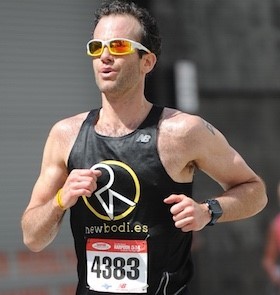 Author Bio
Author Bio
Bryan Falchuk is the founder of newbodi.es health and fitness coaching and training. He spent the first 2/3 of his life overweight or battling being overweight before transforming his life into one focused on health, fitness and happiness. He coaches and trains people looking to change their lives, has an active YouTube channel and podcast , and shares his own health journey and inspiration via his blog , Instagram and Twitter.




































































































